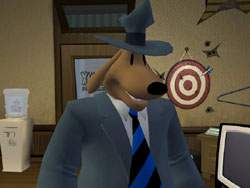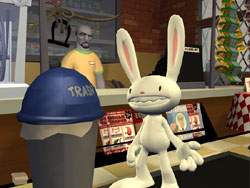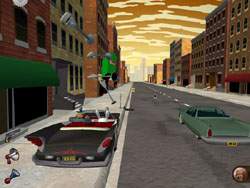Format: PC (via download)
Price: $8.99 (approx. £4.99)
Link: www.telltalegames.com/samandmax
Nostalgia is something that you'll often hear me talking about whenever I review games. There is something about gaming that even now, as a fully grown and fairly hairy adult, automatically makes me think back to those first games that I played as a kid. Now, nothing makes me more nostalgic about the gaming of my youth than the thought of point and click adventures. In my early teens I was absolutely hooked on them, with none enticing me more than those glittering gems from LucasArts’ catalogue. Whilst similar offerings from rivals like Sierra were teeth-clenchingly difficult and often fairly punishing (having your character walk on a particular spot could trigger his immediate and unheralded death, instantly ending your game!), LucasArts adventures would never permanently stymie their players and were always tremendous fun to solve. My formative gaming hours – not to mention my pocket money – were whittled away as I followed the adventures of characters like Guybrush Threepwood, Bernard, Indiana Jones, Manny Calavera… and, of course, Sam & Max.

Soon, other popular point and click franchises – like Revolution's BROKEN SWORD and Psygnosis' DISCWORD series – were following suit and making their own permanent switch to 3D. Slowly but surely developers eschewed the mouse-driven adventure in favour of keyboards and joypads. The problem was, of course, that point and click adventures just didn't work like that, and so soon even the game mechanics themselves were changed to make them more console-friendly, and point and click fans switched off in their droves. The long-awaited ESCAPE FROM MONKEY ISLAND failed to achieve the glowing reviews that had been afforded its predecessors, and despite selling almost twice as many copies of this title as they had THE CURSE OF MONKEY ISLAND, LucasArts convinced themselves that adventures no longer sold. Two highly anticipated sequels in development – one to SAM & MAX: FREELANCE POLICE and the other to cult hit FULL THROTTLE – were canned, and LucasArts – the company who had practically invented the graphic adventure game – announced that it would abandon the genre in favour of churning out a thousand STAR WARS games a year. This was a sign to many that the days of adventure gaming really were over; but then, shining out from the crush of identikit FPS, RTS, MMORPG and Sims titles announced by the big developers, was a tiny glimmer of hope.

SAM & MAX: CULTURE SHOCK is a modern adventure game with a difference, and that difference can be boiled down to one, solitary thing – the interface. You see, the enduring appeal of those early point and click titles is encapsulated in something that I like to call “one-handed gaming” (stop sniggering at the back!) – those evenings where you’ve stayed up way too late, one hand on the mouse and the other on your mug of coffee, laughing yourself silly at all of the gags whilst peering at the screen as you sweep the mouse pointer around for clues, desperately trying to solve that one last puzzle before you'll allow yourself to go to bed. You simply can’t replicate that feeling – or that effortless connection to the game world – with a joypad – and this is clearly something that Telltale have realised, because with CULTURE SHOCK it’s mouse-action all the way. Yes, really. Not a joypad in sight, and quite frankly it's glorious.
CULTURE SHOCK's wonderful 3D cartoon visuals – all stylised shapes, flat comic book colours and simplistic shadows – serve as the perfect counterpoint to a deceptively simple (and mainly one-click) control system. Clicking about the screen will cause Sam to walk there, whilst clicking on people will initiate a conversation. Objects that you can interact with cause the cursor to glow, and clicking on them will prompt Sam to perform the appropriate action. If the object can be picked up, he’ll pick it up. If it can be used, he’ll use it. If it’s only there for comedy value, he’ll snap out a one-liner, all of them wonderfully written. Once an item is in Sam’s inventory, it can be examined for clues with a right-click , or brought out for use with a left-click. Pressing Escape on the keyboard will bring down the menu. allowing the user to save, load or to tweak the gaming options – and that’s it. No keybinding options, no list of controls as long as your arm… just two clicks and one keyboard button. Genius.

So that's the good – and now here comes the bad. Every decent game has a weak link, and CULTURE SHOCK's is its sound. Sam and Max themselves are, thankfully, perfectly voiced, but many of the supporting characters – especially the Soda Poppers, twee midgets acting as unwitting henchmen to the villain of the piece – have voices that grate on the nerves like fingernails on a chalkboard. If these were bit-parts it wouldn't be so bad, but when a large chunk of the game centres around talking to them – and often seeing the same little cutscenes over and over again and you try and fail to solve a puzzle – it really is inexcusable. Hopefully this is something that Telltale will bear in mind as the series progresses, because leaving the exposition of vital information to NPCs whose lines the player feels compelled to skip is really a bad idea, not to mention poor game design.
If you're an adventure fan, you probably only want to know one thing – is CULTURE SHOCK any good? And the answer is a resounding yes, provided you can get over the urge to shoot screech-faced dwarfs in the face. Is it as good as the best of those games of yore? Not quite... but it's almost there. Episode two (SITUATION: COMEDY) is released on the fifth of January; if it can build on the solid base provided by this first instalment we may be hailing these games as classics yet.